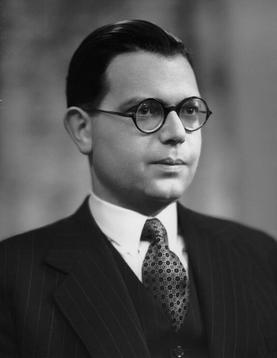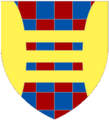Arthur Cockfield, Baron Cockfield facts for kids
Quick facts for kids
The Lord Cockfield
|
|
|---|---|

Cockfield in 1952
|
|
| European Commissioner for Internal Market and Services | |
| In office 7 January 1985 – 5 January 1989 |
|
| President | Jacques Delors |
| Preceded by | Karl-Heinz Narjes |
| Succeeded by | Martin Bangemann |
| Chancellor of the Duchy of Lancaster | |
| In office 11 June 1983 – 11 September 1984 |
|
| Monarch | Elizabeth II |
| Prime Minister | Margaret Thatcher |
| Preceded by | Cecil Parkinson |
| Succeeded by | The Earl of Gowrie |
| Secretary of State for Trade President of the Board of Trade |
|
| In office 6 April 1982 – 11 June 1983 |
|
| Monarch | Elizabeth II |
| Prime Minister | Margaret Thatcher |
| Preceded by | John Biffen |
| Succeeded by | Cecil Parkinson (Trade and Industry) |
| Minister of State for Treasury | |
| In office 6 May 1979 – 6 April 1982 |
|
| Monarch | Elizabeth II |
| Prime Minister | Margaret Thatcher |
| Preceded by | Denzil Davies |
| Succeeded by | John Wakeham |
| Member of the House of Lords Lord Temporal |
|
| In office 14 April 1978 – 8 January 2007 Life Peerage |
|
| Personal details | |
| Born | 28 September 1916 Horsham, West Sussex, England |
| Died | 8 January 2007 (aged 90) |
| Political party | Conservative |
| Alma mater | London School of Economics |
Francis Arthur Cockfield, Baron Cockfield (born 28 September 1916 – died 8 January 2007) was an important person in British and European politics. He worked as a government official, led a big company, and was a politician for the Conservative Party. He also served as a European Commissioner.
He held several key roles in the UK government. He was a Minister of State at the Treasury from 1979 to 1982. Then he became the Secretary of State for Trade from 1982 to 1983. After that, he was the Chancellor of the Duchy of Lancaster from 1983 to 1984. From 1984 to 1988, he worked for the European Commission. He is often called 'The Father of the Single Market' because of his big role in creating it.
Contents
Early Life and Education
Arthur Cockfield was born in Horsham, West Sussex, England. This was just one month after his father, Lieutenant C. F. Cockfield, sadly died in a famous battle called the Battle of the Somme during World War I.
He went to Dover Grammar School. After school, he studied law and economics at the London School of Economics, a well-known university.
Early Career
In 1938, Cockfield started working for the Inland Revenue, which is the UK's tax department. He quickly moved up in his career there. From 1945 to 1952, he was the Director of Statistics. He even became a Commissioner, a very senior role, from 1951 to 1952.
After his time at the Inland Revenue, he joined a large retail company called Boots. He started as their finance director. Later, he became the managing director and chairman of the company from 1961 to 1967. He also worked with the National Economic Development Council, which advised the government on economic matters.
Interestingly, Arthur Cockfield was known as Frank for most of his life. However, he didn't like that name. His granddaughter remembers him saying he wanted to use his middle name, Arthur, instead.
After leaving Boots, he advised a Conservative politician named Iain Macleod on taxes and the economy. He was also the president of the Royal Statistical Society from 1968 to 1969. When Macleod passed away, Cockfield continued to advise the new Chancellor of the Exchequer, Anthony Barber, until 1973. From 1973 to 1977, he was the chairman of the Price Commission, which looked at prices of goods. He was also given a special honour, becoming a Knight Bachelor, in 1973.
Political Career
In 1978, Arthur Cockfield was given the title of Baron Cockfield. This meant he became a member of the House of Lords, which is part of the UK Parliament.
When Margaret Thatcher became Prime Minister in 1979, he was appointed a Minister of State at the Treasury. He held this important financial role until 1982. In 1982, he joined the Privy Council, a group of senior advisors to the Queen. He was also the last Secretary of State for Trade before that government department merged with another in 1983.
After the 1983 general election, Lord Cockfield became the Chancellor of the Duchy of Lancaster. In this role, he didn't have a specific department to run. Instead, he worked as a special advisor and a "think-tank" for the Prime Minister, Margaret Thatcher.
In 1984, Lord Cockfield left the UK government to join the European Commission. This is like the executive branch of the European Union. He became the Commissioner for Internal Market, Tax Law, and Customs. He also served as a vice-president under Jacques Delors, who was the President of the Commission.
Many people expected him to follow Margaret Thatcher's views, which were often cautious about European integration. However, Lord Cockfield became a key person in creating the Single European Market. This market aimed to remove barriers to trade between European countries by 1992. Just a few months after starting his new job, he wrote a huge report. It listed 300 things that made trade difficult and set a plan for how to remove them. He was not chosen for a second term and was replaced by Leon Brittan.
Later Life
After leaving the European Commission in 1988, Cockfield worked as a consultant for a big accounting firm. He received a high honour from Belgium, the Grand Cross of the Order of Leopold II, in 1990. He also received special degrees and awards from many universities in Britain and America.
Personal Life
Arthur Cockfield was married twice. He first married Ruth Helen Simonis in 1943. They had a daughter and a son, but they divorced in the early 1960s. Later, in 1970, he married Monica Mudie, who was a choreographer. Monica passed away in 1992.
Lord Cockfield and his wife Monica are buried on the Isle of Man.
Images for kids



